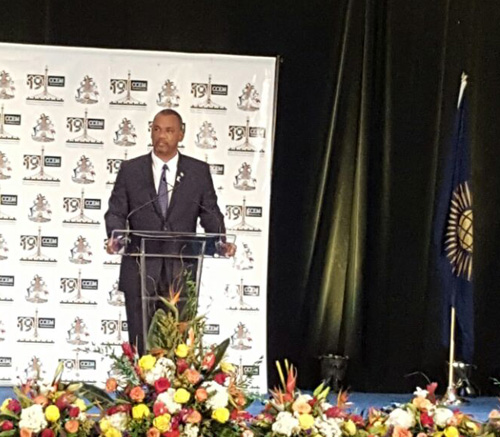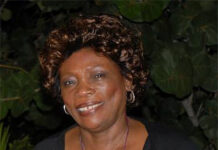A watershed point in Education where delegates at the 19CCEM developed the goals for the next 15 years!

Paradise Island, The Bahamas – The following are Closing Remarks by The Honourable Jerome K. Fitzgerald Minister Of Education, Science and Technology at the Closing Ceremony of the 19th Conference of Commonwealth Education Ministers in the Bahamas, made on Friday, 26th June, 2015:
I am humbled to have served as the Chair of the 19th Conference of Commonwealth Education Ministers. This week we have been immersed in the world of education and have examined the challenges of policy makers, teachers and students. The presentations, discussions, exchange of ideas and collaboration have been an engaging learning experience for us all.
I have learned much from my colleagues this week and my life has been deeply enriched by their presentations and the discussions that we have had.
My fellow Ministers of Education and members of the education fraternity; we have a great deal of work to do. Those of us present at this 19CCEM have many things in common; but it is really our shared commitment to education and the appreciation of its power to transform and elevate the people that unite us. As I stated during one of our plenary sessions, “as a group, we are only as strong as our weakest link.”
Because we know the inherent value of education, we must find ways to strategically and creatively communicate and transfer that value and appreciation to our citizens. As Malcolm X said, “by any means necessary.”
It is therefore imperative that we embark on an aggressive Commonwealth education campaign, that “through quality education, we can change the world.”
We must put action to words. If we are not able to transfer what we have shared and received into practical application that is culturally relevant, needs based and flexible enough to meet the needs of today’s diverse group of learners, our meeting this week would have been in vain. We must now implement! Our fierce drive to implement must be sustained and measurable, driven by an uncompromised political will.
As I reflect on this past week and all the rich content of the various Ministerial Meetings, I am also reminded of the sage insight given by St. Lucia’s Governor General, Her Excellency Pearlette Louisy. Her Excellency reminded us that “education must be at the centre of resilience,” and that every vulnerability has a resilient response; in essence, the vulnerability and challenges we face, which stifle our progress also presents an opportunity – a chance for us to unlock and set free our resilience from the shackles of insecurity and fear. Her Excellency also impressed upon us Small States that “being small is no excuse to be silent.”
The historical context of this 19CCEM cannot be forgotten. Thirty (30) years ago, The Bahamas hosted the Commonwealth Heads of Government Meeting and our then Prime Minister and Father of the Nation, the Right Honourable Sir Lynden Pindling, as host minister, chaired that meeting. The titans in the world of politics and leadership were present. Margaret Thatcher, Brian Mulroney, President Mugabe Kenneth Kaunda and many others were present on this very island. The central issue on the agenda was the dismantling and decommissioning of apartheid in South Africa and the release of Nelson Mandela, the great Madiba. The year was 1985 and it was the first time that CHOGM was held in a Small State.
The conclusion of the 1985 CHOGM was the formulation of what became known as the ‘Nassau Accord – The Commonwealth Accord on Southern Africa’. In the ‘Nassau Accord’ and I quote, “We are asking the President of Zambia, and the Prime Ministers of Australia, The Bahamas, Canada, India, the United Kingdom and Zimbabwe to develop with the Secretary-General the modalities of this effort to assist with the process of political dialogue with South Africa, to facilitate the process to: Release immediately and unconditionally Nelson Mandela and all others imprisoned and detained for their opposition to apartheid.” The ‘Nassau Accord’, which is a Commonwealth document, is possibly the most beautiful document the Commonwealth has ever written. It is the full circle of what the Commonwealth represents, in values and ideas and it happened in this town that you presently sit in.
Sir Lynden led the charge to free Mandela. In recognition of Sir Lynden’s leadership, upon Mandela’s release, one of his first acts was to travel to The Bahamas to personally say thank you to Sir Lynden and The Bahamas. This is a clear reminder that “being small is no excuse for being silent.”
Let this meeting held in an historic country in the Commonwealth, act as a basis for establishing education not only as a priority, but as a core value. As Ministers of Education, we are cognizant of the fact that our Ministries are the most important ministry within any government. We impact finance, national security health, social services as well as youth and culture. We must therefore remain relentless in advancing the education agenda.
Our Prime Minister, the Rt. Hon. Perry Christie has often reminded us that “education, not money is the cure for poverty and likewise, education, not jail is the solution for crime.”
Before I conclude, I would like to express my sincere gratitude to all those who contributed to the overwhelming success of this event. First, I thank all those delegates who travelled from near and far to be here, to add value to our discussions. I would also like to thank all the exhibitors who brought another dimension to this year’s conference. Additionally, I tip my hat to all Bahamian government agencies who partnered with us to ensure the smooth operation and execution of this conference. Moreover, I would like to thank all the stakeholders, students and teachers who participated in the 19CCEM. A special thank you is also extended to Dr. Marcellus Taylor, The Bahamas’ liaison to CommSec. Lastly, I thank the Commonwealth Secretariat for the confidence placed in the Ministry of Education, Science and Technology and the Government of The Bahamas in hosting a conference of this caliber. We have showcased the incredible ingenuity and ability of Small States. I appreciate the sentiments of Commonwealth Deputy Secretary-General, Deodat Marahaj said on the opening night, “things haven’t gone well, things have gone exceptionally well. The Bahamas has set a standard and lifted the bar that will be tough for other larger countries to follow.”
As I close, I must say, this week has been one of immense pride. It has afforded me the opportunity to collaborate with some of the best minds and to forge partnerships that are mutually beneficial. Above all, this has been an experience of a life-time, to have served as Chair of this historical 19CCEM as the global education community transitions from Millennium Development Goals to the Sustainable Development Goals. I have no doubt that we are now reenergized and refocused to reposition our students and our country on the path for success.
Thank you for joining us in The Bahamas for the 19CCEM. I wish you all safe travels as you take the warm spirit of The Bahamas throughout the Commonwealth. May your passion be continually re-ignited and may the flame of hope and optimism for ‘Quality Education for Equitable Development: Performance, Paths and Productivity’ never be extinguished.
Thank you!











![A Con Artist [RACIST] wants Bahamians to fight progress – WELL, WHAT IS THIS?!](https://www.bahamaspress.com/wp-content/uploads/2025/07/Toby-Smith-218x150.jpg)